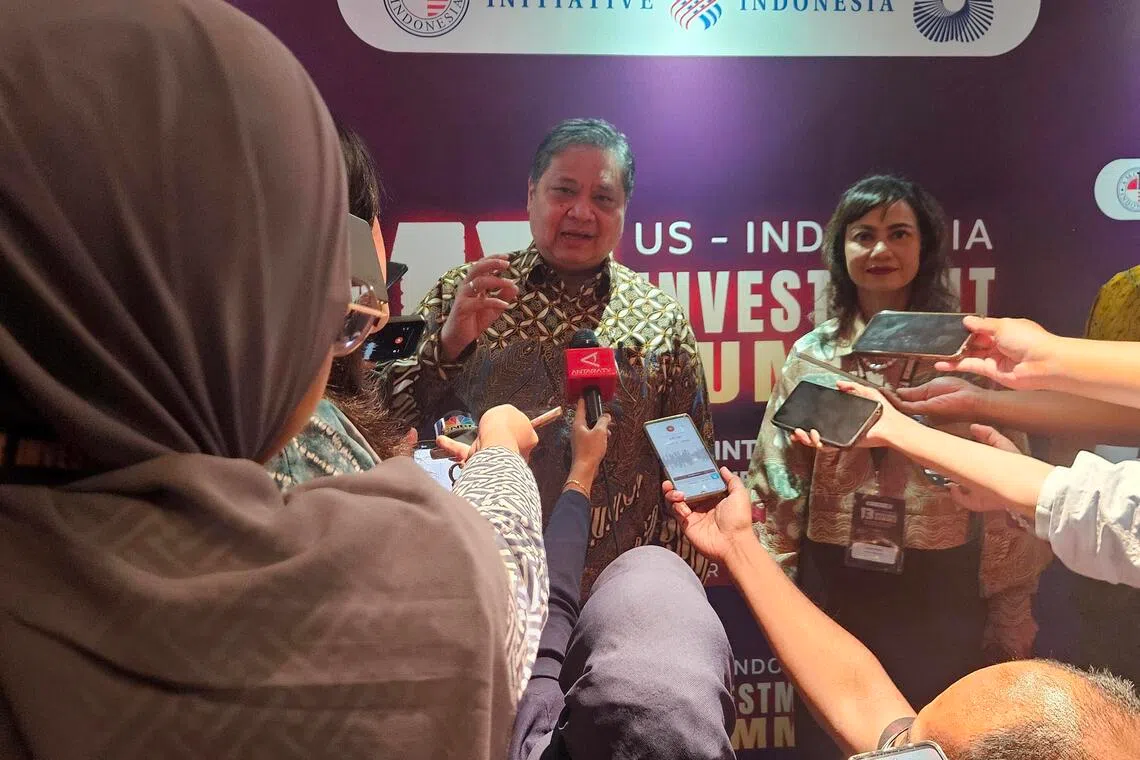Jakarta to allow US firms to sell energy to Indonesia without competitive bidding
Sign up now: Get ST's newsletters delivered to your inbox

Coordinating Minister for Economic Affairs Airlangga Hartarto speaks to reporters at Indonesia-US 13th investment summit in Jakarta on Nov 17.
ST PHOTO: WAHYUDI SOERIAATMADJA
Follow topic:
- Indonesia will allow US firms to directly sell energy to Pertamina, bypassing competitive bidding, to finalise a tariff deal.
- This agreement aims to reduce tariffs on Indonesian exports to the US from 32% to 19% in exchange for importing US goods.
- Critics warn this preferential treatment distorts the market, potentially causing financial losses for Pertamina by missing the best prices.
AI generated
JAKARTA – Indonesia will allow firms from the United States to sell energy products directly to state-owned oil and gas firm Pertamina without going through the usual competitive bidding process, in a move aimed at finalising a tariff deal between the two countries.
South-east Asia’s largest economy and the US are ironing out details on a deal reached in July 2025, under which Indonesia’s exports to the US would face a tariff rate of 19 per cent instead of 32 per cent.
In return for the reduction in the tariff rate, Indonesia among other things pledged to import US$15 billion (S$19.5 billion) worth of energy products and US$4.5 billion worth of agricultural commodities from the US. In 2024, Indonesia ran a US$18 billion trade surplus with the US.
At the 13th US-Indonesia Investment Summit in Jakarta on Nov 17, Coordinating Minister for Economic Affairs Airlangga Hartarto said Indonesia will realise those pledges immediately, but did not provide a timeframe.
“At the moment, we are drafting a presidential decree to allow state-owned oil and gas company Pertamina to make direct purchases without a competitive bidding process from US suppliers,” he said at the event attended by business leaders and foreign diplomats.
Under current rules in Indonesia, selling energy to Pertamina requires a competitive tender process.
“We are still negotiating with the US. Hopefully, we can sign the agreement not too far from now… We are keen to seal the deal,” said Mr Airlangga.
He said both sides have reviewed all the details of the deal and plan to sign it this year.
Under the agreement with the US, selected Indonesian commodities not produced in the US will be subject to zero per cent tariffs. These include crude palm oil, rubber, tea and coffee.
Stressing that the US has been Indonesia’s most valued strategic partner, Mr Airlangga said the country has been working so hard to get America to support the business environment in Indonesia.
Asked by The Straits Times whether the preferential treatment given to the US would spark protests from other countries, Mr Airlangga said: “When we give concessions to one country, others would also want it, and that is normal.”
He said Indonesia has comprehensive economic partnership agreements with Europe, Canada and China, and these can be the platforms to discuss extending similar preferential treatment.
More than half of Indonesia’s fuel imports are currently from Singapore, which refines crude oil from the Middle East, Australia and Malaysia.
In 2024, Indonesia imported petroleum worth US$11.4 billion, or 53 per cent of its total petroleum imports, from Singapore, while only US$19 million worth of the commodity came from the US, or less than 0.1 per cent of the total petroleum imports, according to government data.
Most of the remaining fuel imports were from Malaysia (valued at US$4.5 billion), China (US$1 billion) and Saudi Arabia (US$825 million).
Following Indonesia’s plan to buy more fuel from the US, including refined fuel and liquefied natural gas, Energy and Mineral Resources Minister Bahlil Lahadalia said on May 9 that the country would gradually shift some imports away from Singapore.
Mr Fabby Tumiwa, executive director of the Institute for Essential Services Reform, a Jakarta think-tank, cautioned that the preferential treatment offered to the US amounts to a distortion of the free market.
“By sourcing energy from the US without a competitive bidding process, Pertamina loses the opportunity to secure the best market price,” Mr Fabby told ST.
“Failing to obtain the most competitive price would result in financial loss to the state, effectively amounting to an act of corruption,” he added.


